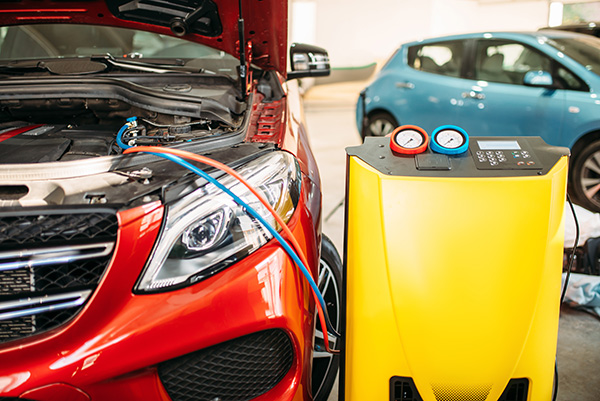
On a sweltering summer day, there's nothing worse than getting into your car, cranking up the AC, and realizing it's blowing warm air. A malfunctioning car air conditioner can be a major inconvenience, turning what should be a cool, comfortable ride into an unbearable experience. But what causes your car's AC to stop working? We'll share the most common issues that can disrupt your vehicle's cooling system.
Low Refrigerant Levels
One of the most frequent culprits behind a failing car AC is low refrigerant levels. Refrigerant is the substance that circulates through your AC system, absorbing heat and cooling the air. Over time, small leaks can develop in the AC system, causing the refrigerant to slowly seep out. When the refrigerant level drops too low, the AC can't cool the air effectively.
If you notice your AC isn't as cold as it used to be, or if it starts blowing warm air, it's a good indication that you might be low on refrigerant.
Leaks in the AC System
Leaks can occur at various points in the AC system, such as the hoses, connections, and even the compressor itself. These leaks are often difficult to detect because the refrigerant evaporates quickly when exposed to air. However, a professional technician can use special tools to locate and repair these leaks.
It's crucial to address leaks promptly, as they can lead to more significant issues if left unchecked. In addition to causing low refrigerant levels, leaks can also allow moisture and contaminants to enter the system, potentially damaging other components.
Faulty Compressor
The compressor is the heart of your car's air conditioning system. It's responsible for pressurizing the refrigerant and circulating it through the system. A faulty compressor can lead to a complete AC failure. There are several reasons a compressor might fail, including electrical issues, overheating, or a lack of lubrication. When the compressor fails, it can't pump refrigerant through the system, rendering the AC useless.
Replacing a compressor can be costly, but it's essential for restoring the functionality of your air conditioning.
Electrical Problems
Modern car AC systems rely heavily on electrical components. Fuses, relays, and wiring all play a critical role in ensuring the AC functions correctly. An electrical problem, such as a blown fuse or a faulty relay, can prevent the AC from operating. Additionally, damaged or corroded wiring can disrupt the power supply to the AC system.
Diagnosing and repairing electrical issues can be complex, so it's best to leave this task to a qualified technician who can pinpoint the exact cause and fix it.
Clogged or Dirty Condenser
The condenser is located at the front of the vehicle, right behind the grille. Its job is to dissipate the heat absorbed by the refrigerant, allowing it to cool down before it cycles back through the system. Over time, the condenser can become clogged with dirt, debris, and insects, which can impede its ability to release heat. A dirty or blocked condenser can reduce the efficiency of the AC system, causing it to blow warm air.
Regular maintenance, including cleaning the condenser, can help prevent this issue.
Broken Cooling Fans
Cooling fans play a crucial role in keeping the condenser cool, especially when the vehicle is stationary or moving slowly. If the cooling fans are not working correctly, the condenser can't do its job effectively, leading to poor AC performance. Electrical issues, damaged fan blades, or a faulty fan motor can cause broken or malfunctioning fans.
Ensuring the cooling fans are in good working order is essential for maintaining the overall efficiency of your car's AC system.
Experiencing AC problems? Don Lee's Tire & Auto has the expertise to get your car's AC running like new. Contact us today for fast and reliable service.